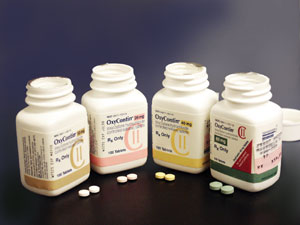 Settling state and federal charges in 2007 for illegal marketing and covering up fatal overdose risks and paying more than $650 million did not stop the maker of OxyContin from continuing to aggressively push its dangerous product. In fact, Purdue Pharma increased its efforts to convince doctors and dentists to prescribe its brand name version of delayed-released oxycodone and continued to publicly declare that OxyContin posed less risk for abuse, addiction and death than similar opioid painkillers.
Settling state and federal charges in 2007 for illegal marketing and covering up fatal overdose risks and paying more than $650 million did not stop the maker of OxyContin from continuing to aggressively push its dangerous product. In fact, Purdue Pharma increased its efforts to convince doctors and dentists to prescribe its brand name version of delayed-released oxycodone and continued to publicly declare that OxyContin posed less risk for abuse, addiction and death than similar opioid painkillers.
Not knowing that would happen at the time, our Virginia dangerous drug law firm reported that
The U.S. Attorney for the Western District of Virginia (VA) should be commended for a five-year fight against this big drug company. They were able to extract a fine of over 600 million dollars. They obtained convictions against three individuals for crimes associated with this fraud. Hopefully, big pharmacy companies in the future will pay attention that sometimes the government will take them to task for false advertising. However, the company still made well over a billion dollars that didn’t have to be disgorged.
So, big drug companies may make the decision that even if they get caught lying about their drugs that they can still make huge profits. The three executives had to pay fines individually of over 30 million dollars. The very idea that company officials should have 30 million dollars individually to pay a fine shows that something is wrong in the way our corporate culture in America works.
LEARN MORE
- Deaths of Tom Petty, Prince Connected by Dangerous Opioid Medications
- Virginians Welcome New Restrictions on Opioid Painkillers
- Family Behind Opioid Epidemic Pocketed Billions While Knowing OxyContin Posed Deadly Dangers
Fast-forward to 2019, and watch Purdue Pharma once again attempt to settle OxyContin lawsuits. Following the lead of fellow oxycodone and opioid manufacturer Mallinckrodt, Purdue offered a universal settlement of up to $12 billion on several dozen claims brought by states, counties, cities and individuals.
The intervening 12 years saw opioid overdoses overtake motor vehicle accidents as the leading cause of preventable deaths in the United States. Crime and health problems related to addiction to OxyContin and its close chemical twins of fentanyl and heroin also spiked.
The drug companies who produced opioid medications simply flooded towns with product. A database maintained by the U.S. Drug Enforcement Administration and made public via a Freedom of Information Act request revealed that “76 billion prescription pain pills from the country’s biggest pharmaceutical companies poured into the U.S. from 2006 through 2012.”
Governments, including Virginia’s, began taking the threat of overprescribing opioids seriously in 2017. Decisions were also made to handle painkiller addiction as more of health crisis than a criminal matter. Death rates have ticked downward, but the drug makers who created the problem have yet to be held fully accountable.
Nor will paying a new round of settlements deter bad actors. For instance, Purdue’s proposed settlement would allow it to continue selling OxyContin and to fund payments to plaintiffs through sales of OxyContin outside the United States, where regulations are less onerous.
Opioids do have legitimate uses, especially for breakthrough cancer pain and as a component of end-of-life palliative care. But the painkillers are not meant for use at anywhere near they level they have been over the past two decades. Sending that message to companies like Purdue as forcefully as possible is required.
EJL